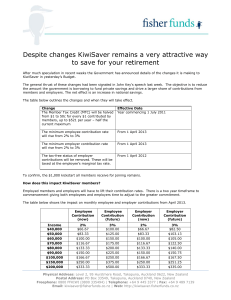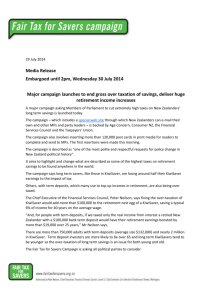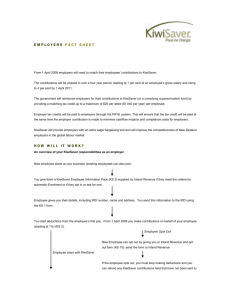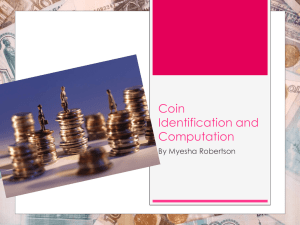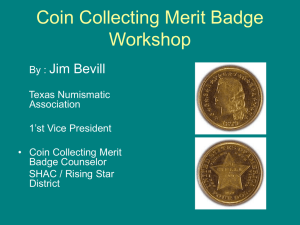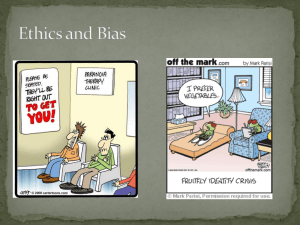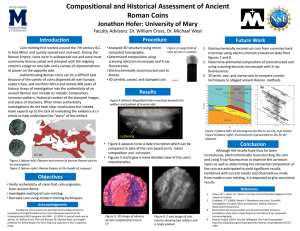Income - Money
advertisement
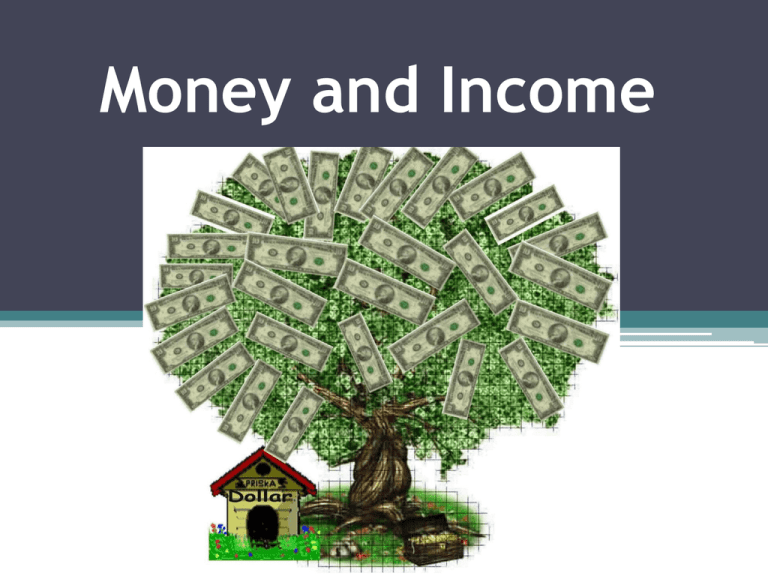
Money and Income Money • Students will have an understanding of how money has evolved – the history • Students will have a knowledge of other countries currencies and understand that each country has their own currency • Students will have understanding of the money of NZ Do Now – 3 mins Students in groups of 4 list as many terms as they can for money Do Now – ANSWERS Dough, Cash, Bills, Bucks, Dosh, Moola, Smackeroos, Bread, Stash, Loot, Wads, Lucre, Clams, Quids, Greenbacks etc… • Money is something that we hear and talk about a lot, and so it is important to understand how it works so we can make it work for us, rather than against us. The History of Money In the old days people lived in small family groups and were self-sufficient. What they produced (by hunting and gathering) they consumed themselves When people began to live in small settlements, they began to specialise (produce only products they were good at making) and traded for what they did not produce. Trading goods for other goods is known as BARTER. Because of problems with barter, people began to introduce the first forms of money as a medium of exchange. Common items used were shells, beads, precious metals and even salt. But to barter effectively you need to have a DOUBLE COINCIDENCE OF WANTS. Eg: a person who wants to trade something must find a person to trade with who has what they want and wants what they have. This is time very time consuming! The form of money that began to dominate ancient societies were precious metals, such as gold and silver. These had real value, were long lasting and could be broken down into smaller amounts. Early forms of money A 640 BC one-third stater coin from Lydia. Metals were scarce, but large amounts were heavy. Instead of carrying around this type of money, people began to deposit their coins with goldsmiths (which turned into banks) and used IOUs (paper notes) which could be swapped for coins at other goldsmiths. QUESTION: Which country issued the first PAPER NOTE? The first paper money was issued by the Chinese Ming Government in 1374. The notes were called “Great Ming Precious Notes”. DO NOW: What is the currency of the following countries (In Groups of 4) 1.Canada 2.Australia 3.Russia 4.England 5.France 6.South Africa 7.Japan 8.Finland 9.Hong Kong 10.China DO NOW: What is the currency of the following countries ANSWERS 1.Canada – Canadian Dollar 2.Australia – Australian Dollar 3.Russia – The Ruble 4.England – British Pound 5.France – The Euro 6.South Africa – The Rand 7.Japan – The Yen 8.Finland – The Euro 9.Hong Kong – The Hong Kong Dollar 10.China – The Renmenbi or Yuan In the 21st century there are new ways of accessing bank accounts EFTPOS, phone and internet banking. QUICK QUIZ QUESTION – What does EFTPOS stand for? QUICK QUIZ QUESTION ANSWER Electronic Funds Transfer at Point of Sale In the future all forms of physical money may be obsolete, as technology enables us to use cards, cell phones and computers to access our bank accounts QUIZ In groups of 4 How much do you know about NZ Money 1. What is the smallest value coin in NZ? 2. What is on the front of a NZ 50 cent coin? 3. Whose picture is on the back of all NZ coins? 4. In what year did NZ do away with 1 and 2 cent coins? a)1985 b)1990 c)1995 d)2000 5. Whose picture is on the front of the $50.00 note? 6. What is on the front of the $2.00 coin? 7. In what year did NZ do away with 5 cent coin? a)2003 b)2004 c)2005 d)2006 8. What colour is the NZ $10.00 note? 9. Whose signature is on every NZ bank note? 10. What bird is on the back of a $5.00 note? How much do you know about NZ Money ANSWERS Swap your answers with the group next to you 1. What is the smallest value coin in NZ? 2. What is on the front of a NZ 50 cent coin? 3. Who is on the back of all NZ coins? 4. In what year did NZ do away with 1 and 2 cent coins? b) 1990 5. Who is on the front of a $50.00 note Sir Apirana Ngata 6. What is on the front of the $2.00 coin? Kotuku – White Heron 7. In what year did NZ do away with 5 cent coin? d) 2006 8. What colour is the $10.00 note 9. Whose signature is on every NZ bank note? The Reserve Bank Governor OR Graeme Wheeler 10. What bird is on the back of a $5.00 note? Yellow Eyed Penguin (or Hoiho) Income Income • Students will have an understanding of the types of income people can earn • Students will understand the types of deductions from income • Students will have understanding of term deposits and cumulative interest. What is income? Income is money received from employment, investments, or interest from deposits. Scenario – READ ONLY Arishna and Bharvna are Year 10 students who have been friends since they were in primary school. Bharvna always knows when Arishna is worried about something. ‘What’s up Arishna?’ ‘I think I need to get a job. I need more money to do the things that I want to do and I probably should be saving some money too’. ‘Have you thought about the type of job you would like?’ Bharnva asked. ‘That’s the problem. I’m not really sure what job I want. There seem to be so many things to consider. How about you Bharvna, will you be looking for a job?’ ‘Not yet – I don’t have time. But there are many ways obtaining money’. Brainstorm in groups the different ways of obtaining money – getting an income Brainstorming - ANSWERS Salary = a regular fixed payment received each fortnight or month regardless of how many hours you work Wage = a regular payment received based on the hours that you work Commission = a payment received based on the level of sales obtained Interest on investments = money you receive from the bank on a term deposit Allowances = pocket money from your parents Inheritance = money you receive from someone when they die (given to you in their will) Winning LOTTO! Not everyone gets the job of their dreams straight away! What they did before they were famous Brad Pitt used to dress up as a chicken for El Pollo Loco Kanye West used to work at Gap. Kanye actually rapped about it on his debut album, in the song "Spaceship"! Madonna was a Dunkin' Donuts clerk Hugh Jackman used to dress up as a clown for birthday parties. You tube clip – How Bizzarre 12mins http://www.youtube.com/watch?v=9inDbPSRNvk In groups discuss the answers to the following questions 1. How much did Pauly Fuemana earn from the song “How Bizarre”? 2. How much did his manager make? 3. What did he do with all the money he made? 4. What does bankruptcy mean? 5. What mistakes do you think he made and what advise would you offer? Exercise: A bit of math If Pauly Fuemana put half of the money he earned from “How Bizarre” into a term deposit account for one year @ 5% interest per annum – how much interest would the bank have given him? 1 x year @ 5% p.a = $ ???? If he had left the money in the bank for 2 years how much interest would he have earnt. 3 years? 4 years? How many years would it take for him to double his initial deposit of $2.5m to $5million? Exercise Answer • Refer excel spread sheet for calculations • How Bizarre came out in 1995 and if Pauly had of put half into the bank that year then by 2010 he would have doubled that initial amount to $5.197m How much can I expect to earn when I leave school? Calculate the following Minimum wage for 16 years+ is $13.75 per hour x 40 hours per week x 52 weeks per year = ???? per annum (year) Deductions from your Income Think/Pair/Share: • What types of things can be deducted from your income before it is paid to you? Think/Pair/Share: ANSWERS What types of things can be deducted from your income before it is paid to you (other than income tax)? Income tax, Student loan, Child support, Kiwisaver NB: if you earn less than $2240 per annum you do not have to pay any tax. What is income tax? If your income is from salary, wages or benefits, tax will automatically be deducted under the PAYE (pay as you earn) system. Why do you have to pay income tax? Taxes pay for government services such as education, health, infrastructure (roads, bridges), unemployment benefits etc.. Income Rates for tax year 20122013 – for every dollar you earn Taxable income Income tax (PAYE) rates up to $14,000 12.20 cents from $14,001 to $48,000 19.20 cents from $48,001 to $70,000 31.70 cents $70,001 and over 34.70 cents No-notification of tax code 46.70 cents What is Kiwisaver? KiwiSaver is a voluntary work savings scheme set up by the government to encourage NZ’ers to save for their retirement. If you're employed, you can choose to contribute 3%, 4% or 8% of your gross (before-tax) wage or salary to your KiwiSaver account. Benefits of KiwiSaver • Your employer has to contribute at least 3% of your gross wage or salary into your KiwiSaver account. That’s on top of your own contributions. • Your KiwiSaver contributions come out of your pay before you see it. This makes saving easy. • The government gives you $1,000 when you open a kiwisaver account. • KiwiSaver savings can be used as a deposit subsidy on your first home purchase. Winning Lotto! NZ Herald Article http://www.nzherald.co.nz/nz/news/article. cfm?c_id=1&objectid=10904339 Big winner Trevor has family problems Students to read article and to discuss issues that arise from winning a large amount of money You don't want to win the Lotto jackpot - here's why http://www.nbr.co.nz/article/youprobably-dont-want-win-tonights-25m-lotto-jackpot-ck-115427 Winner: Michael Carrol Winnings: £9.7million Year: 2002 What went wrong: 26-year-old unemployed UK man blew fortune on drugs, gambling and "thousands of prostitutes." Wife left, taking child. Where is he now?: Back on the dole, taking home £42 per week. Winner: Billie Bob Harrell Jr Winnings: $31 million Year: 1997 What went wrong: Texas lottery winner's spending and lending to friends, and fellow members of his church, got out of control. Strain then ruined his marriage. Where is he now?: Committed suicide 20 months after winning. Winner: Abraham Shakespeare Winnings: $31 million Year: 2006 What went wrong: A woman who had befriended him - and fleeced him for $1.8 million, say police - has been charged in connection with his murder." Where is he now?: Found buried under a concrete slab. Winner: Callie Rogers Winnings: £1.9million Year: 2002 What went wrong: Ms Rogers - 18 at the time of her win - spent the money on cocaine, breast implants, cars, gifts and holidays. Where is she now?: Broke, working as a maid. Attempted suicide twice. How much can I expect to earn after 5 years working in the following industries? Calculate the following using the previous formula • • • • • • • • • • • • Hotels and Restaurants - $16.20 per hour Retail - $17.18 per hour Arts and Leisure - $21.86 per hour Construction - $23.31 per hour Manufacturing - $23.70 per hour Transportation - $24.10 per hour Real Estate - $25.16 per hour Mining of Forestry - $25.68 per hour Technical or Science - $29.72 per hour Education - $30.78 per hour Telecommunications $32.47 per hour Finance and Insurance - $35.37 per hour http://www.expatfocus.com/expatriate-new-zealand-salaries?gclid=CN2VuKDy1rkCFUMRpAodpXcApg Sending money home to the islands http://www.moneypacific.org/ Sending Money home video – 1.48mins Sending money home comparison • http://www.sendmoneypacific.org/ • Show the students the difference in fees between all the places that can transfer money overseas.
